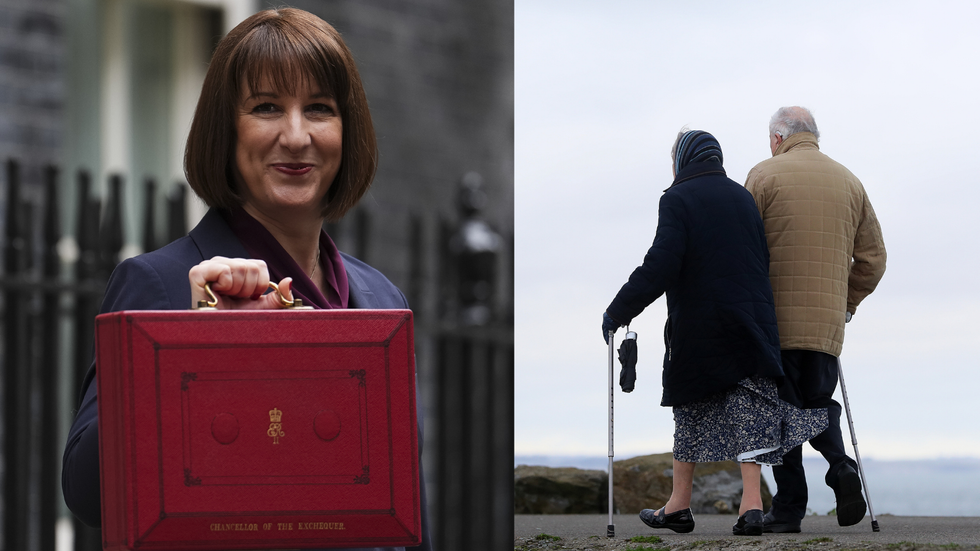Keir Starmer failed to rule out more tax rises this morning despite Chancellor Reeves introducing the largest tax raising budget in recent memory on October 30.
The PM, who has seen his personal popularity fall faster than any leader in modern times, pointed to international events like Russia’s invasion and Covid as examples that could see the Treasury raise tax again.
He said: “What I can’t do is say to you there are no circumstances unforeseen in the future that wouldn’t lead to any changes at all, because if you just look at Covid and the Ukraine situation, everybody knows there are things that we can’t see now.
“But I can tell you our intention was to do the tough stuff in that Budget and not to keep coming back… it’s tough but fair, but at least we know now with certainty and we can plan.”
 Rachel Reeves has targeted pensions and farmers with inheritance tax changesGB News
Rachel Reeves has targeted pensions and farmers with inheritance tax changesGB NewsHis refusal to rule out more tax rises has left many wondering what the PM can tax next, assuming he is to keep to his to his pre-election promise of not raising income tax, VAT, or National Insurance.
GB News has asked two economic experts to give their view on the matter.
Jason Hollands, managing director of Evelyn Partners, said: “In one sense it is unsurprising that the Government doesn’t want to tie its hands by ruling out further tax rises.
“After all, Labour’s pre-election pledge not to raise the rates of Income Tax, VAT and National Insurance – as well as a commitment not to raise corporation tax – seriously boxed in its revenue raising options at the last Budget.
“But with trust in the Government now low, many people will also interpret the Prime Minister’s refusal to rule out further tax rises as a more ominous signal.
“There are doubts as to whether some of the measures being introduced will raise anything like the amounts expected, and growth forecasts are also being downgraded by some economists, which could mean a future short fall that will need to be filled either by more tax or spending cuts.
“The Government’s spending assumptions assume a big splurge next year but after that are expected to see real terms rises of 1 per cent.
“With ballooning state pension and healthcare costs from an ageing population, a defence budget that is inadequate for the dangerous times we live in, and public sector unions likely to come seeking further pay rises, you have to wonder whether they are really prepared to keep such a tight lid on spending.”
LATEST FROM MEMBERSHIP:
Sarah Coles, Head of Personal Finance at Hargreaves Lansdown, took a different view, however.
She said: “There’s no need to panic. This isn’t a signal that more taxes are on the way.
“The government is clear to point out that there’s no plan to come back for more tax after the hikes in the Budget.
“However, no politician wants a George W Bush moment of promising no more taxes and then having to change their mind later.
“So Starmer made it clear that there’s no plan for new taxes, but the government will have to roll with the punches if it’s hit by a surprise out of the blue.
“One thing to watch will be if the government can deliver on its growth promises.
“If it can, then the tax take will naturally rise and provide more income, but if something goes awry, it could be fall short of where it wants to be, and that’s when taxes could become a consideration again.
“It’s important not to start the ball rolling of more tax speculation at moments like this. It can be incredibly unsettling and get in the way of people making sensible long-term plans for their finances.
“We can’t ever know exactly what any government has up its sleeve, so we need to get on with doing the right thing for our circumstances right now.”
Labour could look at two other areas that were untouched in previous Budget. The Individual Savings Accounts (ISAs) were actually introduced by New Labour in 1999, replacing an earlier savings scheme with a more flexible alternative.
However, one report by the Resolution Foundation (a Labour policy thinktank) has argued that HMRC could save £1 billion each year by capping ISA savings at £100,000. – Labour could go after ISA savings.
Meanwhile making tax relief on pensions less generous could also be an option. The 2024/25 annual allowance for paying into a pension without incurring tax is £60,000 and the current £1,073,100 standard lifetime allowance for tax-free contributions was effectively abolished on 6 April.
Shadow chancellor Mel Stride said: “Keir Starmer has already raised taxes to historic levels.
“Now he claims he wants to give business certainty, but he can’t answer a very basic question – will he or won’t he raise more taxes?”
Chancellor Reeves is set to raise £40billion from her October 30 budget, most of which is coming from a £25billion rise in Employers’ NIC.
Ms Reeves raised taxes by £40 billion at the Budget on Oct 30, with the lion’s share of the increase coming from a £25 billion decision to increase employer National Insurance contributions.